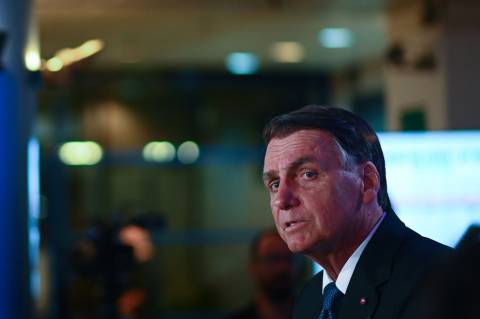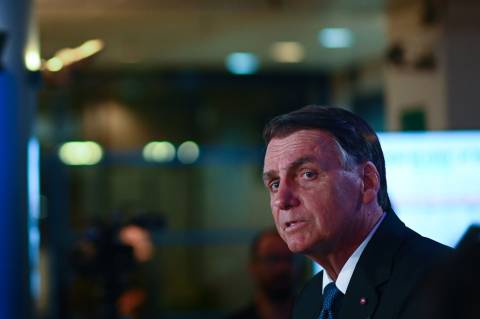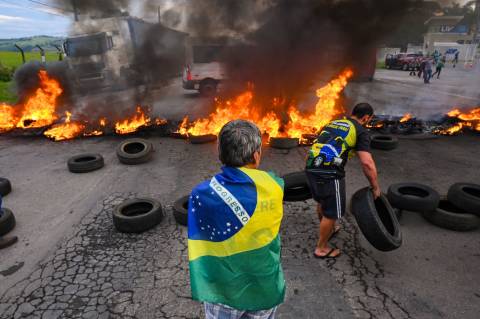(Bloomberg) -- Protests by backers of Jair Bolsonaro intensified as the Brazilian president remained silent over his loss in Sunday’s election, refusing to concede defeat to his old foe Luiz Inacio Lula da Silva.

Supporters of the firebrand president, unhappy with the election’s results, blocked roads around the country and restricted access to Sao Paulo international airport, forcing the cancellation of some flights on Monday night. Over 300 federal highways were partially or fully blocked, according to the police, leading a judge to order the roads cleared.

Bolsonaro has refused to make any public comments after the electoral court said he lost Brazil’s runoff to Lula on Sunday by less than 2 percentage points, the narrowest margin for a presidential election in the country’s modern history. Newspaper Valor Economico reported that the president may acknowledge the result of the election in a written message on Tuesday amid growing speculation in Brasilia about the president’s next steps.

Read More: Lula Edges Out Bolsonaro to Win Presidency of Divided Brazil
The president on Monday met with his Chief of Staff Ciro Nogueira and some other ministers and advisers as well as his oldest son, Senator Flavio Bolsonaro. In a tweet on Monday afternoon, Flavio Bolsonaro thanked his father’s supporters and said they wouldn’t give up on Brazil, without specifically referring to the outcome.
While the president’s decision to not immediately recognize the result isn’t a complete surprise given his long history of attacks against Brazil’s electoral system, it’s hardly a sign that the institutional framework of the country is about to be derailed.
The heads of the country’s senate and lower house quickly accepted the election results on Sunday night along with the supreme court justices and some of Bolsonaro’s closest allies. US President Joe Biden also congratulated Lula in a phone call on Monday.
Read More: Biden Congratulates Lula in Call as Bolsonaro Remains Silent
“He’s going to keep working normally through the end of his mandate,” said Tarcisio de Freitas, a former infrastructure minister under Bolsonaro who was elected governor of Sao Paulo state.
Yet the president’s silence can hurt the transition process. By law, Brazil’s government needs to organize a formal handover process right after the vote, with the president-elect allowed to nominate 50 people to meet officials and exchange government information. The outgoing administration typically coordinates with the team of the next president during the following two months so there is a smooth transition when the new government takes over Jan. 1.
If Bolsonaro decides not to accept the results, it would halt “the traditional government transition process that starts right after the election,” Rio de Janeiro-based political analyst Thomas Traumann wrote in a note Monday. “Bolsonaro will use the next two months to handicap Lula’s administration from the beginning.”
Truck drivers are one of the main bases of Bolsonaro’s support and yield a significant political power in a country as geographically extended as Brazil. While grassroots groups don’t accept the president’s electoral loss, their protest was disavowed by the federation of truckers, which gather the main transportation companies in the South American nation.
Meanwhile, Brazilian assets have largely shrugged off initial concerns, with stocks of companies expected to benefit from Lula’s presidency rallying on Monday after the election while the real reversed earlier losses to post the biggest gain among the world’s major currencies.
Read More: ‘Lula Basket’ Jumps, Real Leads Global Gains After Brazil Vote
While a strategy to try to discredit the election “is unlikely to yield a favorable result for Bolsonaro, that can be a tactic to keep his base mobilized to oppose a Lula administration,” Eurasia Group analysts wrote in a report.
More stories like this are available on bloomberg.com
©2022 Bloomberg L.P.
Author: Juan Pablo Spinetto
